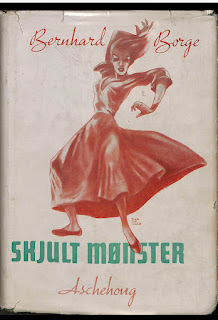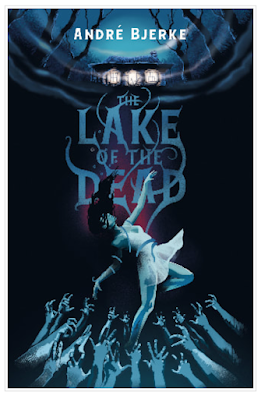"Let's summarize: A lake that sucks people into it, an invisible phantom that screams and leaves footprints, a crazed double murderer on the loose, wandering around desperately in the dark of night. You might indeed say this is a fitting atmosphere for a psychoanalyst."
-- Gabriel Mørk in The Lake of the Dead (1942)
Is there anyone out there who knows of the existence of Bernhard Borge, the Norwegian author of four eerie detective novels tinged with horror and supernatural elements? Unless you grew up and read Norwegian popular fiction I doubt it. Borge is the pseudonym of André Bjerke, a well regarded poet who dabbled in crime and detective fiction during the 1940s. According to James Jenkins' extremely informative intro in this new English edition of the second Borge mystery novel I learned that it was Bjerke who is behind the Borge alter ego. Jenkins, publisher and founder of the excellent small press Valancourt Books, also serves as translator for the first English edition of what has been deemed a classic in horror and crime fiction by Norwegain readers. The Lake of the Dead (1942), or De dødes tjern as Norwegians know it, consistently appears on "Best of..." lists as the best remembered classic Norwegian mystery novel. Astonishingly, at one time it outranked even the work of modern Norwegian bestselling crime writer Jo Nesbó.
Let me add a clarifying bit to that statement about Norwegian readers only knowing about The Lake of the Dead. The book was so popular that it has been filmed twice. It's first cinematic adaptation in 1958 with a screenplay by Bjerke (and featuring the writer in the role of Gabriel Mørk) is still available online from Sinister Cinema in a DVD with English subtitles. If any English speaker does know about the story it is probably because they have seen the movie rather actually reading the original book.But to the book itself!
Anyone who craves the kind of detective novel that incorporates impossibility and apparently supernatural aspects will get more than they ever bargained for in The Lake of the Dead. It easily stands beside the mystery novels of John Dickson Carr, Hake Talbot and Eric Harding's Pray for the Dawn for its eerie atmosphere and use of grisly legends. Each time Bjerke describes the lake and its surrounding forest the book amps up the horror and the macabre. All senses are employed as the reader is transported to the Norwegian haunted lake with the stench of rotting marshes, the croaking of frogs "as if calling from the abyss" and the miasma of fog that seems interminably wrapped around the perimeter of its waters. Paranoia and terror infect the inhabitants of the cabin by the lake recalling the fear of the guests of U. N. Owen in And Then There Were None as they try to prevent more of their number becoming victims of the ghost that lures people to their doom in the lake's haunted waters.
And there's more to draw in fans of Golden Age detective novels here. Like the Philo Vance series Bjerke creates a narrator character along the lines of S. S. Van Dine. Bernard Borge is not only the author of his detective novels he is the narrator. Borge is paired up with psychoanalyst Kai Bugge who serves as the real detective of the books in which he appears. According to Jenkins' intro Bugge serves as detective in three of the four Bernhard Borge mystery novels.Borge opens The Lake of the Dead with a bemoaning monologue in which he tells a group of friends that he is suffering from writer's block and is about to give up on writing altogether. We learn that Borge is a mystery novelist and his friends dare him to tackle a real mystery and challenge his failing imagination. His lawyer pal tells a story about a haunted lake where ages ago a crazed man grabbed an ax and chopped up his cheating wife and her handsome male lover, dumped their bodies in the water, then committed suicide by drowning himself. One of the friends, Bjørn Werner, has recently rented the shunned cabin by the shores of that very lake. The friends decide to visit for a weekend and hope that Borge will be inspired by the haunted locale to write his next mystery novel. When they arrive Bjørn is nowhere to be found, nor is his pet dog he took with him. They discover footprints leading to the water but none that return to the cabin. It appears he was lured to the lake and disappeared. Or did the ghost of that mad murderer drag Bjørn down into the lake’s rumored bottomless depths?
 |
| 3rd Borge novel, English title: Dead Men Come Ashore (1947) |
There are other ingeniously planted clues, much of it related to psychology and psychoanalytic observations. In this regard The Lake of the Dead is reminiscent of the mystery novels of Helen McCloy whose psychologist detective Basil Willing also acted as a police consultant by using his career training to help him understand the psyches of the suspects and the victim. Similarly, readers might recall the Freudian ramblings of Mrs. Bradley in the mystery novels of Gladys Mitchell. I get a sense from Kai Bugge's character and his intense theorizing that Bjerke understood psychoanalytic methods much more in depth than Mitchell's often specious psychology when it cropped up in the Mrs. Bradley books.
 |
| Borge's 4th & final novel English title: Hidden Pattern (1950) |
Whether you are keen on Carr-like supernatural elements, the battle between the true believer in other-worldly events and the rational scientist, or enjoy a detective novel that plumbs the depths of psychological mysteries that lead to crime The Lake of the Dead has a lot to offer. Jenkins is to be commended on his discovery and for making at least this one Borge mystery available to English language readers. I certainly hope we have not seen the last of Bernhard Borge and the fascinating psychological detective Kai Bugge.
The web page for Valancourt Books edition of The Lake of the Dead will lead you to various other web pages where can purchase a copy. Or you can enter my giveaway by leaving comment below. That's right I'm giving away two copies of this new edition! Just tell me anything about a forgotten foreign language mystery or horror novel that you think we all ought to know about - translated into English or not. No geographic restrictions this time because I'm having Amazon ship the book to you! [Why didn't I think of that before?] So enter away and leave me loads of comments every one of you out there. This new edition is really is a cause for celebration.



Thanks for the offer. A foreign-language mystery I would recommend is 'The Borrowed' by Chan Ho-Kei, which was translated into English a few years ago. I first learned about this book from Ho-ling's amazing blog, which praised this book highly. Basically, this contains interlinked short story collections featuring Hong-Kong Police Force. At first, I went into this book with little expectation since I thought it was another police procedural, and I usually prefer classic puzzle mysteries. However, this book exceeded my expectation. It has not only rich cultural flavor in the stories, but they are also densely plotted and contain very clever puzzles. The book is also structured interestingly, using reverse chronology. While each story features separate cases, they are linked in creative ways. I seldom see a review of this book in the mystery blogosphere, and I think it deserves more attention.
ReplyDeleteAndrew
This title was published by Macdonald in England in 1961 as "Death in the Blue Lake" translated by John Coombe - see the British Library catalogue
ReplyDeleteThat may be true about another English translation but it really can’t be counted. When you read Jenkins’ intro you’ll learn that it was taken from a German translation making it a translation of a translation! The Valancourt edition is based on the original Norwegian text.
DeleteThe first foreign-language horror novel that came to my mind is Alfred Kubin's sombre fin-de-siècle fantasy, The Other Side. Mike Mitchell's translation (available from Dedalus) is well-regarded.
ReplyDeleteDaniel
Pierre Véry - official site - http://pierrevery.fr/ - wrote distinctive and eccentric books, many made into films - most notably Goupi Mains-Rouge and L'Assassinat du père Noël. Alan Grimes, a retired haematologist, translated and self-published a few as a hobby.
ReplyDeleteThis looks awesome and I love the different covers. I can’t say forgotten, but I’m really loving I Remember You by Yrsa Sigurdardottir (Icelandic). Starts off creepy from the start and maintains a steadily increasing sense of unease. Friends trying to repair an old (haunted?) home in the off season of an isolated, seasonal community (also haunted?). Parallel story revolving around unexplainable schools break-ins and disappearances that may be somehow connected.
ReplyDeleteAlso, Alex by Pierre Lemaitre (French). Part of the Detective Verhœven series. Not for the faint of heart.
DeleteJoel
I've been looking forward to this coming out! As for other detective novels, I read Bjerke's DØDE MENN GÅR I LAND in Norwegian a few years ago, and I loved it -- its eerie atmosphere was very reminiscent of Carr, though the mystery was less so. I don't think it's ever been translated into English, but if my Norwegian wasn't so rudimentary I'd be tempted to do it myself.
ReplyDeleteI have never read a foreign language mystery or horror novel so I don't have any insight to offer here other than to say I look forward to this book!
ReplyDeleteMax Havelaar met Zombies by Martijn Adelmund came out 2016 and is a rewrite of the 1860 colonial critical stories by Multatuli with the added horror of zombies. Although an old book and translated, adding zombies can be a good way to discuss the remaining problems and horrors from the Dutch colonial past.
ReplyDeleteThis is John again using the Anonymous option… Yours is the most fascinating contribution to the comments on this post. Thanks for enlightening me about such an unusual book. Is it translated into English? I have a post on zombies in mystery fiction lined up for May.
DeleteHis Mysteries in Nederland/ Amsterdam is I think translated as Unsolved Mysteries of Amsterdam (2008), but not the Max Havelaar with zombies as far as I can see (yet).
DeleteThis comment has been removed by the author.
Deletehello, I go to the obvious Japanese author Edogawa Ranpo ( or Rampo) AKA Tarō Hirai, pretty well known, a slight cheat I plump for the short story The Early Cases of Akechi Kogoro.
ReplyDeleteOn Vernon Loder as you sadi Black heath put out a lot of his books here in the UK, available at a modest price for kindle with poor covers, but Collins re-iss'd The Shop Window Murders on e-book and Hardback, it can be picked up new (came out about 2018) but reasonable 2nd hand copies are available.
Cheers,
Wayne.
there are three Loder books reprinted in that Collins imprint. They’re all so “old” (over five years ago) I didn’t bother reminding people. And I usually only talk about the availability of the book under discussion. I’ve already reviewed Shop Window... years ago and the post includes info on those reprints. No sense in repeating it all I say.
DeleteThe podcast Strange Studies of Strange Stories (née HP Lovecraft Literary Podcast) covers at least one of Ranpo’s stories (The Human Chair, I believe) and does a nice job of providing an intro to his writing.
DeleteJoel again